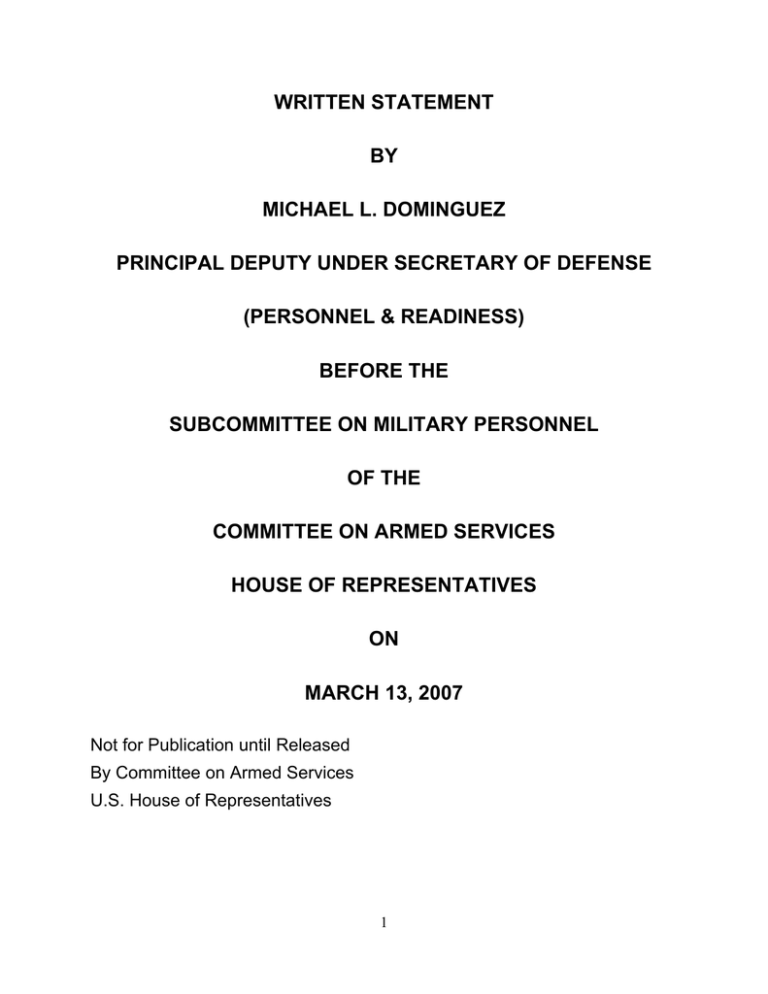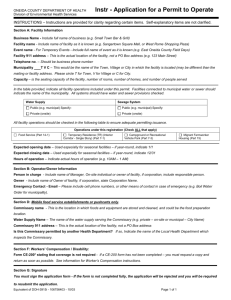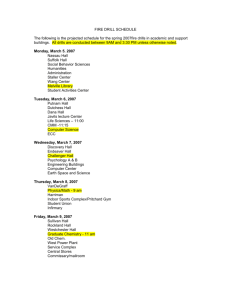WRITTEN STATEMENT BY MICHAEL L. DOMINGUEZ PRINCIPAL DEPUTY UNDER SECRETARY OF DEFENSE
advertisement

WRITTEN STATEMENT BY MICHAEL L. DOMINGUEZ PRINCIPAL DEPUTY UNDER SECRETARY OF DEFENSE (PERSONNEL & READINESS) BEFORE THE SUBCOMMITTEE ON MILITARY PERSONNEL OF THE COMMITTEE ON ARMED SERVICES HOUSE OF REPRESENTATIVES ON MARCH 13, 2007 Not for Publication until Released By Committee on Armed Services U.S. House of Representatives 1 Chairman Snyder, Representative McHugh, and Distinguished Members of the Subcommittee, I am honored to appear before you to testify about the military commissary and exchange programs. The Department of Defense is committed to providing a high quality of life for military members serving our Nation and their families. We recognize that the commissary, exchange and morale, welfare, and recreation (MWR) programs have a profound impact on the quality of life of our military families. As the oversight of MWR programs will be covered on March 29th, my testimony today addresses Department of Defense oversight of the commissary and exchange benefits. Before discussing those matters, I would like to thank the Subcommittee for its support in helping the Department advance the commissary and exchange benefits for our Soldiers, Sailors, Airmen and Marines. The collaboration between the Department and the Congress has ensured that the resale system keeps pace with the changes taking place within the Department, our society, and the business world. Your advocacy has delivered many of the authorities needed for the Department to become more effective in providing commissary and exchange benefits. THE RESALE BENEFITS The commissary and exchange programs are among the most valued contributors to the quality of life of our Service members and their families. Commissary and exchange programs are essential components of the military compensation and benefit package, and are important contributors to morale and readiness. Familiar products and services are made available at a savings as a benefit for our active duty members. In addition, these programs support mission activities around the globe. Finally, they provide a safe and convenient community hub, particularly in overseas areas. 2 THE RESALE SYSTEMS The resale system is designed to meet the day to day needs of our Service members and their families and must be capable at all times of supporting our forces deployed throughout the world. The readiness of our military forces is dependent upon many things, including the systems that sustain our members and their families during deployments. The Defense Commissary Agency (DeCA) operates a world-wide system of 263 commissary stores that sell name brand grocery and household necessities to military personnel and their families. The commissary system is operated entirely with appropriations and goods are sold at cost plus a 5 percent surcharge. This fiscal structure is designed to save military families an average 30 percent and produce $279 million annually to support capital investment in store systems and shopping facilities. The Military Services run three world-wide Exchange systems that operate retail complexes on 297 military installations, catalogs, and web sites that sell a wide range of merchandise and services to the military community. The Exchanges also provide resale activities to support military missions on board 156 ships and in 58 contingency operations, including deployed locations and disaster relief areas. The Army and Air Force Exchange System (AAFES), the Navy Exchange Service Command (NEXCOM), and the Marine Corps Exchange (MCX) are operated predominantly with self-generated nonappropriated resources and with Military Service appropriations authorized for limited purposes. The exchanges price their goods to average at least 15 percent savings to the customer and to produce revenues at a level set by their Military Service to sustain exchange capitalization requirements and to help finance their MWR programs. OVERSIGHT The Secretary of Defense assigns responsibility to the Under Secretary of Defense for Personnel and Readiness, USD(P&R), for overall supervision and policy direction on 3 the commissary and exchange operations. The Military Departments, through their representation on the Commissary Operating Board, advise the USD(P&R) on the funding and operation of the commissary system and assist in the overall supervision of the Defense Commissary Agency. The Military Departments have fiduciary responsibility for funding the three exchange systems and each Military Service supervises their Exchange through a board of directors. Where the commissary and exchange interests intersect, the Congress showed great foresight by establishing the Executive Resale Board. Commissary Operating Board. The Commissary Operating Board, chaired by Lieutenant General Ann E. Dunwoody, USA, has proven most effective in making recommendations that the Military Services will support financially and supervising DeCA’s performance. The Board provides critical advice on the commissary stores needed by the Military Services, management initiatives to improve DeCA’s performance, and priorities for investing in systems and construction. Under the Commissary Operating Board supervision, DeCA's management has a proven track record of achieving performance goals. Since 2000, DeCA increased sales, sustained capital investment, and reduced costs through business process improvements – all while improving customer savings and satisfaction ratings. Executive Resale Board. The Executive Resale Board, which I chair, advises the USD(P&R) on the complementary operation of commissary and exchange systems. Since its members may also serve on the Commissary Operating Board and the Exchange boards, the Executive Resale Board shows great potential to improve oversight where there are mutual or competing interests. The Executive Resale Board reviews joint construction projects, resale information system standards, resale cooperative efforts, combined store operations, and evaluates merchandise authorized for sale, including the results of the impulse merchandise test in commissaries. In this regard, the resale commanders are compiling their first year test results on the ten commissaries selling 4 film, one-time use cameras, and telephone cards. As requested by the Congress, the Department will furnish a report within 60 days. The Executive Resale Board recently tasked the Resale Commanders to evaluate opportunities to operate collaboratively, such as alternative store formats and placing exchange food operations in commissaries. Since the "combined store" format, with its limitation on appropriated support, has not been successful in the U.S. as a way to continue commissary and exchange support, the Director, DeCA and Commander, AAFES are examining options to alleviate the financial losses at the two remaining combined stores, operated by AAFES at Naval Air Station, Joint Reserve Base, Fort Worth and the Homestead ARB. THE CHALLENGE OF CHANGE The road ahead is a challenging one for our military families and the institutions that serve them. Our commissaries and exchanges are supporting military personnel and their families as the force mobilizes, deploys, and rotates in large numbers. In addition, the military community is migrating to a new global posture and domestic base structure to which our commissaries and exchanges must adapt. Finally, our resale activities must respond to rising customer expectations and the reality of competition in a global and networked marketplace. Commissary and exchange benefits are important contributors to readiness. There is, therefore, no choice but to adapt the commissary and exchange programs to the challenge of change while continuing to deliver the benefit. That alone would be hard, but, in an increasingly tough fiscal climate, these institutions have to adjust to BRAC and global repositioning, meet their world-class competitors head-on, embrace the internet, support a warfight, and do all of that WHILE improving performance. Another challenge is to attract members to our retail complexes on military installations. Two-thirds of our active duty families live off-base, and this number will 5 grow in the years ahead, and over half of military spouses work. As the structure of the military community changes, we must continue to develop other ways to serve patrons who are not close to an active duty installation -- including our Guard, Reserve, and retired members. Where it makes sense to build and operate stores, the unprecedented increase in construction costs dictates that we create the optimal store designed for the location and population it serves. DeCA and the Exchange Services are using technology and best practices to build and operate attractive and efficient retail outlets offering goods and services that are tailored to the local military market. These are complex challenges that require careful consideration as we manage these critical benefits. We will continue to work with the vast network of our industry and community partners who have a large stake in the viability of our programs. We remain open and committed to different ways of doing business, but we cannot sacrifice the well being of our people and readiness of the force. The Department recognizes the unflagging determination of our commissary and exchange employees to guarantee future success. With the help of Congress, we must enable their creativity, experimentation, and imagination. The Department places great confidence in the Resale commanders and trusts their capability to navigate their organizations through the changing retail and defense environments. The Military Departments also recognize their fiduciary responsibility to provide the resources and set the direction and goals to sustain the commissary and exchange benefits for the ultimate stakeholders, the military members. APPROPRIATED FUNDING FOR MILITARY RESALE PROGRAMS The Department’s goal is to sustain the commissary and exchange benefits, without increasing appropriated fund costs. The President’s budget submission continues the Department’s strong support for Service members and their families. 6 The Fiscal Year 2008 budget fully funds the operation of the commissary system, including foreign currency fluctuations. The DeCA operating costs are budgeted at $1,266.8 million. The appropriations request of $1, 250.3 million covers the operating budget, adjusted for prior years. The Commissary Operating Board closely monitors funding to ensure that DeCA is funded commensurate with its mission and the support provided to each Armed Service. DeCA’s strong stewardship of taxpayer dollars has been demonstrated by the fifth consecutive unqualified audit opinion of its financial records. The Fiscal Year 2008 budget requests $241 million of support for exchanges, which includes $188 million to fully support transportation requirements to ship U.S. procured goods to overseas locations, as is required by the law. The Fiscal Year 2008 budget requests $90 million for exchange programs that support security stabilization efforts in Iraq and Afghanistan and the fight against terrorism in other locations. MEASURING COMMISSARY AND EXCHANGE PROGRAM EFFECTIVENESS Commissaries and exchanges exist to deliver results. We must establish ambitious long term goals to demonstrate that our commissaries and exchanges, individually and in aggregate, are meeting the needs of our Service members and are contributing positively to recruiting, retention, and readiness. We monitor program performance through the Commissary Operating Board, the respective Exchange Boards, and within my office. The commissary and exchange performance are components of the Quality of Life Social Compact Improvement Index in the Performance Accountability Report and the Department’s Annual Report to the President and the Congress. This attention continues to stimulate improvements within the programs and refinements of the measures and benchmarks. DeCA operates under Balanced Scorecard performance metrics. In Fiscal Year 2006, DeCA met all goals. DeCA is improving the quality and availability of goods, 7 maintaining sales levels, reducing costs, and pursuing efficiencies through business system modernization and re-engineering stores and headquarters. These improvements translate to superior customer satisfaction and 32 percent savings for the commissary customer. The Office of Management and Budget (OMB) rated DeCA "Moderately Effective" using the FY 2007 Program Assessment Rating Tool (PART). OMB concluded that commissaries provide a valued benefit to eligible patrons, but also noted that the Department lacks independent evaluations of the commissary’s specific contributions to recruiting and retention. The exchanges are making progress toward producing more standardized performance measures against program and financial goals established by their Military Services. Each of the exchanges is improving business processes and modernizing technology to improve program delivery and operate more effectively. The audited financial statements report that the exchanges are in sound financial condition, with Standard and Poors ratings of A-1+. The exchanges are meeting the goals set by their boards for savings to the customers, sales, profits, capital expenditures and MWR dividends. The exchanges contract for a uniform measurement tool to assess customer satisfaction and are using the results to tailor their organizational initiatives to improve their performance. The Defense Manpower Data Center periodically surveys our customers to understand how they value commissary and exchange benefits. In addition, the Department uses the American Customer Satisfaction Index (ACSI), a nationally recognized measure of customer satisfaction that includes the largest U.S. retailers, as a general measure of satisfaction with the commissary and exchange benefits. These tools, along with the commissary and exchange customer satisfaction assessments, help us identify improvement opportunities that cut across all retail activities. One such opportunity is to address customer expectations about their commissary and exchange. The Department is encouraged by the Resale systems’ initiatives to invest in technologies 8 and expand communication channels that will give customers more information about best value and access to their resale benefits. MIGRATING TO THE NEW GLOBAL POSTURE AND DOMESTIC STRUCTURE Access to the benefits is a pressing concern as we bring thousands of military families home from overseas and close and realign bases. The Department recognizes our obligation to work with the affected communities. DoD is partnering with other Federal Agencies and civilian communities to augment quality of life programs at the gaining installations in the U.S. With our resource constraints, commissary and exchange stores can only be provided at locations where there is a sufficient concentration of active duty members who use our activities. By divesting resale and MWR operations that are no longer required to support active duty missions, resources can be redirected to support the military communities that will experience a significant increase of active duty personnel. Where base populations will grow more than 25 percent in two years, the Military Services may request military construction funding. We add commissary surcharge and nonappropriated funding only when military construction funding is not available or authorized. Some facility projects slated for surcharge or nonappropriated construction may be delayed as we give priority to the needs of active duty populations at the gaining installations and ensure that quality of life programs are sustained. For the joint installations created under BRAC, we are working with the Military Departments and the installation commanders to manage the change. The Military Exchanges may continue separate operations; but, the morale, welfare and recreation programs will merge at all but one location (Henderson Hall/Fort Myer). This is a complex undertaking due to the different ways that the Armed Services distribute 9 dividends, allocate funding, and operate their quality of life programs at the installation level. As a general rule, we do not continue resale operations after an installation closes. At the installations closing under BRAC 2005 and based on our experience in previous BRAC rounds, it is unusual for Local Redevelopment Authorities to seek continuation of the resale activities. As we evaluate specific locations, our primary consideration is the impact of closure and realignment on active duty personnel and their families who use the commissary and exchange. We would continue an operation only if there is a significant active duty population remaining in the area that would otherwise not be supported. Some overseas changes have already been implemented in Germany and the Republic of Korea within the framework of negotiations with host nations. DeCA and AAFES are realigning and rescaling each commissary and exchange to coincide with the changes. Where new missions or significant troop movement create facility requirements, appropriations and funds available under host nation agreements will be sought. At closing installations, agreements with host nations govern payment for the value of our facilities. As implementation progresses, the Resale and MWR programs may absorb some implementation costs and lose some overseas revenue, which may affect capital investment and MWR dividends. CAPITAL INVESTMENT PROGRAMS We appreciate the support of Congress to use appropriations to replace facilities destroyed and damaged by the 2005 hurricane season. As requested by the Subcommittee, the Department is reviewing the cost effectiveness of purchasing commercial insurance for real property. Our findings will accompany the report the Subcommittee requested on the funding and standards for MWR, commissary and exchange facilities. In view of the effects of BRAC, restationing, and rising construction costs, these reviews are timely. 10 DeCA forecasts sales over $5.4 billion that produce surcharge revenues of $279 million in Fiscal Year 2008, although there are fewer stores and a shift of customers from Europe to the U.S. In Fiscal Year 2008, DeCA plans nearly $250 million of capital investment, with $50 million earmarked for information technology modernization and $200 million for facilities and equipment. DeCA is reviewing facilities requirements to more closely approximate current costs and standards. The Commissary Operating Board will provide valuable counsel concerning the actions needed to maintain quality commissary facilities. Collectively, the exchanges estimate profits of $444 million in 2007. The exchanges continue to plan for Defense-wide capital investment programs averaging in excess of $500 million each year, with $145 million identified for information technology modernization and $386 million designated for construction and equipment. On a combined basis, the exchanges plan to distribute $304.7 million (61 percent) of their 2006 profits as dividends, down from $312.5 million in FY 2005. Dividends are projected to fall to $261 million in Fiscal Year 2007. The Department’s report to Congress on facilities funding and standards will address each Exchange individually, since the Military Services separately manage their capitalization programs. THE FUTURE OF THE EXCHANGE SYSTEMS Force repositioning, BRAC, and the Global War on Terror, will continue to challenge exchange profitability. Rather than adopting the Unified Exchange Task Force recommendations, Dr. David Chu, the USD (P&R), agreed with the recommendation by the Military Departments that the individual exchange boards assume responsibility for deciding the way ahead, since each of the boards has a fiduciary responsibility to their stakeholders and is obliged to act in the best interest of those stakeholders. Each Military Department tasked their Exchange board of directors to build on the Task Force work by seeking views on the future of the retail industry and developing 11 business proposals for joint support that could complement transition to the new defense environment. All three of the exchange systems are modernizing their practices to remain competitive in a challenging retail market. The Exchange boards are pursuing cooperative efforts to maximize efficiencies in systems, logistics, and supply. The Exchange Commanders are following a disciplined project management approach to identify projects, goals and benchmarks. I will ensure that we create strong performance goals and effective oversight mechanisms and have every confidence that our exchange programs will successfully transform to the new defense environment. CONCLUSION Mr. Chairman, commissaries and exchanges are an essential component of our quality of life programs. We must institute necessary changes so our men and women in uniform today continue to view these services as one of their most valuable non-pay benefits. The military resale system has the management, resources and drive necessary to see these important benefits through the challenges of transformation and changing expectations. 12





